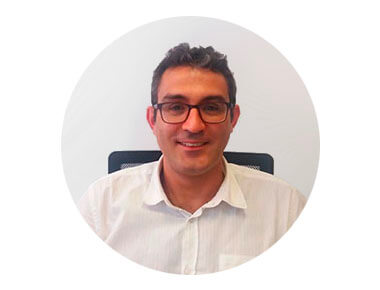
Andrés de la Escosura (PhD 2005) carried out postdoctoral studies at the Radboud University Nijmegen (The Netherlands). He joined Universidad Autónoma de Madrid (UAM) in 2009, where he has held various positions as Assistant Professor, Ramón y Cajal Fellow and, since December 2018, Associate Professor.
Currently, he belongs to the recently created Institute for Advanced
Research in Chemical Sciences (IAdChem) and the Organic Chemistry Department at UAM, where he leads a research group concerned with the study of biohybrid materials and systems chemistry.
After finding useful properties of protein capsids as nanoreactors and nanocontainers to incorporate different kinds of matarials, he is currently working in areas that include biomedical applications, prebiotic systems chemistry and the origin of life.
He is currently the coordinator of the European FET-OPEN Network CLASSY, focused on the construction of cell-like molecular assembly lines of programmable reaction sequences as game changers in chemical synthesis, and the EIC Pathfinder Network CORENET, dealing with complex reaction networks for reservoir computing.
| 11/2022 – present | Profesor Titular at UAM |
| 12/2018 – 10/2022 | Profesor Contratado Doctor at UAM |
| 02/2012 – 12/2018 | Ramón y Cajal Fellow at UAM |
| 01/2009 – 01/2012 | Profesor Ayudante Doctor (Assistant Professor) at UAM |
| 01/2007 – 12/2008 | Marie Curie Fellow at the Radboud University of Nijmegen |
| 04/2006 – 12/2006 | Postdoc at the RUN (funded by the Dutch NWO) |
| 10/2003 – 03/2006 | Profesor Ayudante (University Assistant) at UAM |
| 01/2002 – 09/2003 | Predoctoral Fellowship from the Comunidad Autónoma de Madrid |
| 03/2001 – 12/2001 | Predoctoral Fellowship from the Ministerio de Educación y Ciencia |
| 2014 | Young Investigator Award of the Spanish Royal Society of Chemistry |
| 2018 | John Shelnutt Young Investigator Award of the SPP |
| 2005 | PhD in Science, Universidad Autónoma de Madrid (Spain) Advisors: Prof. Tomás Torres and Victoria M. Díaz Theme: Functional Molecular, Supramolecular and Polymeric Phthalocyanine-Based Systems |
| 2000 | BSc in Chemistry, Universidad Autónoma de Madrid (Spain) |
Andrés de la Escosura Research Group | 2023®